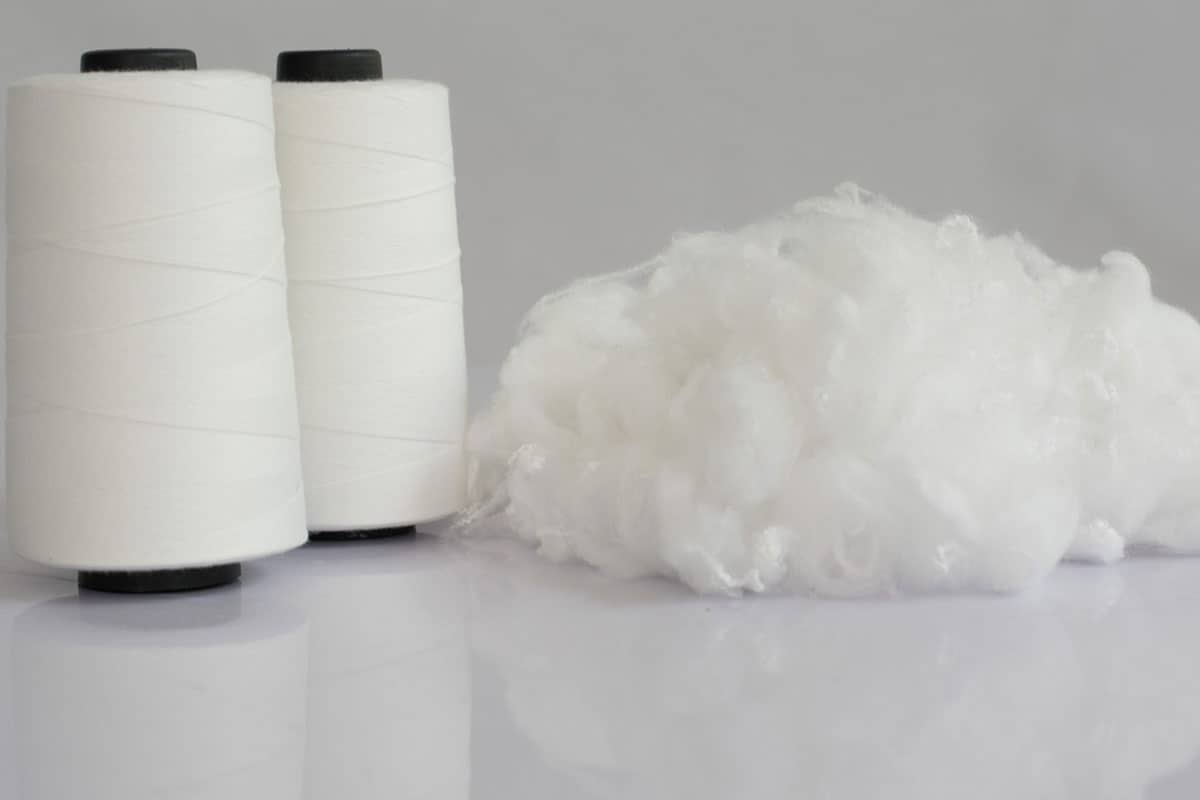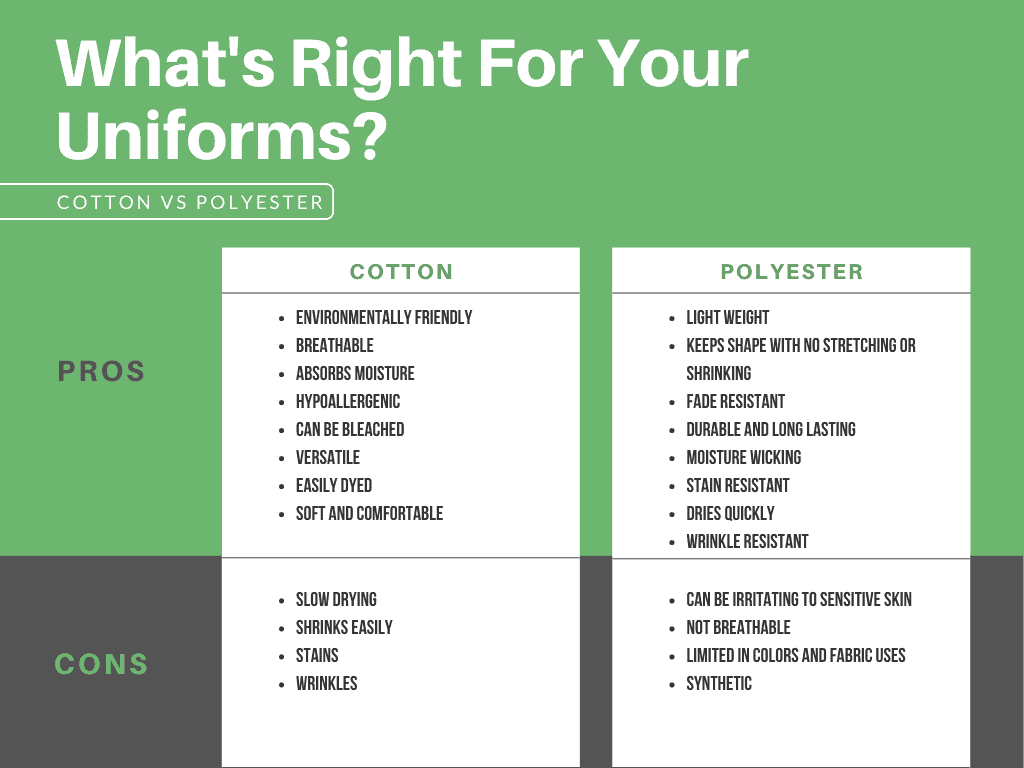
When it comes to deciding on a fabric for the uniforms your employees will be wearing day in and day out, there are multiple factors to consider. Choosing the right cotton, polyester or other fabric depends on the industry and work your employees will be performing and the needs that particular uniform must provide.
Cotton and polyester both have their pros and cons but ultimately it will come down to the best fabric that will keep employees comfortable, looking their best while on the job and providing the most resilient and long-lasting uniform.

Learn about the difference between polyester vs cotton.
What is Cotton?
Cotton is a natural fiber that grows around the seedpod of the plant. It has been around for hundreds of years and isn’t slowing down in its popularity. It is soft and durable in nature making it one of the most popular fabrics in the world.
Once the fluffy, white cotton fibers have been removed from the plant, they are sent to the textile mill to be spun into a cotton yarn and ultimately into cotton fabric.
With cotton being a natural fiber, it is breathable and hypoallergenic. It is used for anything that will be directly touching bare skin. It is one of the softest materials available and helps stabilize body temperature as it absorbs moisture.
Cotton is also versatile. It can be spun into heavier fabrics like canvas, denim, velvet, and corduroy.
Cotton Properties
Since cotton is a naturally occurring fiber, it is biodegradable. That makes it an environmentally friendly fabric. Cotton properties include the fact that cotton fibers actually increase when wet making cotton stronger wet than dry. This is a unique feature of this fabric.
In regards to the uniform industry, cotton is popular because it is easy to manipulate. This means that the fibers are easily dyed. This tops the list as one of the most popular reasons for choosing cotton.
However, because cotton absorbs and holds water, it is slow drying. It is not suitable for wet weather. Cotton clothing wrinkles easily and most often will require ironing before wear.
Cotton will also shrink when washed and dried for the first time. Some manufacturers wash and dry cotton fabrics beforehand, so any clothing made from it is known as pre-shrunk cotton.
Although cotton is easily manipulated and can be bleached and dyed a variety of colors, the dye can eventually fade over time if exposed to the sun.
Cotton Benefits
Benefits of cotton include that it is:
Breathable
Absorbs moisture
Hypoallergenic
Easy to dye or color
Soft and comfortable
One of the most affordable options (based on the current commodity price of cotton).
Organic cotton, in particular, is treated without the use of chemicals, insecticides and pesticides making it a great option for anyone with sensitive skin.
With the many pros of cotton, it is an easy choice to make for uniforms that are looking for a long lasting, breathable, environmentally friendly, customizable option.
What is Polyester?
Developed by a group of British chemists, Polyester was created in the 1940’s. It is an entirely synthetic, man-made fiber. It is a resilient material that can withstand a lot of wear without shrinking, fading, and stretching.
Polyester grew in popularity because of its resistance to wrinkles. Unlike cotton, is it not absorbent. It dries quickly but is not as breathable as cotton. It is the most common man-made fiber in the world. It is everywhere you look and can be found in a variety of products aside from just clothing.
Polyester Properties
Polyester is a durable and long-lasting material. It is resilient and won’t shrink or stretch no matter your laundry skills. It will come out looking great no matter what wash cycle you put it through.
Polyester is stain-resistant because the fibers of the weave are very tight, making it harder for stains to penetrate the fabric. It is possible for oil stains to permeate the fabric and makes them nearly impossible to remove because of this same reason, the tight weave makes it very difficult for the detergents to penetrate the stain and clean it.
Polyester is an odor-resistant fabric making its light weight, moisture wicking abilities attractive to anyone with a physical job that needs to stay cool. Polyester will help you stay cooler but may make you sweat more. Many companies have introduced “moisture wicking” and “dri-fit” lines.
If you work in an industry where you need a long lasting, tough uniform that can make it through washing and wearing it repeatedly for a long period of time, then Polyester is going to be a great option.
Polyester Benefits
Polyester has several benefits. It is:
Wrinkle resistant
Resistant to fading
Extremely durable
Stain resistant
Strong (keeps its shape with no stretching
Polyester is also somewhat odor-resistant because it doesn’t absorb sweat, but allows the moisture (and smell) to evaporate because of its moisture wicking properties.
It is a resilient fabric that can be put through almost any wash cycle you choose and still come out looking ready to wear. Polyester dries incredibly fast and holds dye without fading.
Comparing Cotton vs. Polyester
Choosing the very best material for your clothing or uniforms doesn’t come down to one right answer. It is ultimately going to be decided on what uses the material will be subjected to and the longevity needed. The pros and cons of both cotton and polyester come down to what’s best for you.
If you are headed out on a job, in the mid-summer heat, a polyester moisture wicking fabric might suit your needs best. If you’re looking to customize your company's uniforms in a certain way, then a versatile cotton fabric would be best to obtain the look you have in mind.
Both cotton and polyester have their own set of pros and cons and the bottom line is, it will come down to what you are looking for in a material that meets your needs and provides the comfort and look you wish to obtain. Take a look at the table below for a clearly defined comparison of cotton and polyester strengths and weaknesses to help determine what’s going to meet your clothing or uniform needs.
How to choose which is right for your uniforms?
Cotton will provide your team with the most choices in color and pattern. It allows the skin to breathe but absorbs moisture and is slow drying. Cotton feels amazing to wear because it is soft, comfortable, and is hypoallergenic so you don’t have to worry about any employees with sensitive skin. A high-quality cotton is easy to wash and iron and will make up a quality uniform that, if cared for properly, will last years.
Polyester will limit the fabric and options for uniforms, but it makes up for this with its wash and wear ease. It doesn’t wrinkle or shrink and keeps its shape. Polyester is quick drying and with its moisture wicking properties, it provides a nice benefit to employees working in the hot summer months. A durable polyester uniform will keep these employees cool and dry in the hottest, most humid climates.
Choosing the right uniform for your company will ultimately depend on the industry and work your employees will be performing and the needs that particular uniform must provide. The decision ultimately comes down to the best fabric to keep employees comfortable, looking their best, all while providing a uniform fabric that will withstand the elements of whatever the job is before them.
